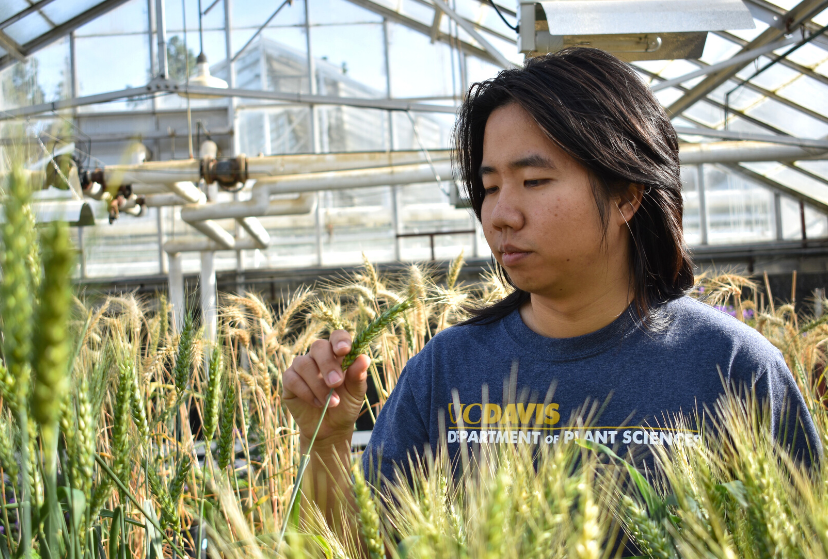Paul Kasemsap
พรพิพัฒน์ เกษมทรัพย์

~growing plants for improved wellbeing
Grad Innovator Fellowship 2020: Meeting Global Protein Demands and Optimizing Resources in the Face of Climate Change
This is an excerpt from an article first published by UC Davis Innovation Institute for Food and Health in April 2020.
Working against the climate clock on creative protein solutions
Pornpipat “Paul” Kasemsap has always had a passion for optimizing agricultural systems. As a PhD candidate in Horticulture and Agronomy with Dr. Arnold Bloom at UC Davis, he has come to understand the complexity of food production. Along the way Kasemsap’s higher education journey provided many opportunities to explore food production in diverse regions of the world such as Thailand, the Netherlands, and then California. Now he combines the different fields of genetics, crop physiology, and agricultural management to optimize plants as a food source.

“Scientists are getting better at communicating their findings to the public. But communication is a two-way interaction. In order to meet global food challenges, we need the public to be engaged and responsive to the issues at hand.” — Paul Kasemsap, 2020 IIFH-FoodShot Innovator Fellow
As a Fulbright Scholar pursuing research in international collaborative environments, Kasemsap is well positioned to develop solutions for the grand challenge of feeding tomorrow’s global population with today’s limited resources. He believes that working with FoodShot Global as a 2020 Innovator Fellow is an essential step toward this ambitious goal. Kasemsap will join the investment platform in advancing a Precision Protein System, where science, technology, investment and innovation are deployed across protein sectors to deliver the maximum benefits to human and planetary health while minimizing resource inputs. “Of course, there is no single solution,” he says. “We need to exchange knowledge across different approaches, and then I am hopeful of democratizing access to sufficient, nutritious protein at a global scale.”
FoodShot is a collaborative investment platform of innovators, investors, industry leaders and advocates working to empower bold ideas and innovative companies that accelerate the transformation to a healthy, sustainable, and equitable food system. FoodShot’s integrated capital continuum awards over $500K in non-dilutive funding via the GroundBreaker Prize, as well as up to $10M of equity or debt investment for innovative businesses. Kasemsap’s experience working with agronomists, breeders, plant physiologist and geneticists will help explore improvements to protein nutrition and sustainability in pursuit of FoodShot’s plans for better human, animal, societal, and planetary health outcomes – including considerations for crops, seafood, meat, and emerging alternative proteins like algae, mushrooms, and cell-based meat.
This aligns with Kasemsap’s human health focus on nutritional solutions to come from future food crops, which will have to be adapted to anticipated climate conditions. Kasemsap and his research colleagues are concerned that expected atmospheric carbon dioxide (CO2) concentrations over the coming decades will have a negative influence on global food and nutrition security by interfering with a plant’s ability to assimilate nitrate into protein. As a consequence, the protein content of food crops may decrease by as much as 15% as CO2 continues to rise.
The “perfect candidate” for tackling Precision Protein
Following his FoodShot engagement, Kasemsap will review the market potential for wheat that is bred to tolerate rising CO2 levels. He characterizes the crop as a “perfect candidate” for meeting the global protein challenge: per gram of protein available for consumption, wheat has minimal impact on greenhouse gas emissions and remains an affordable option compared to other protein sources. On average, this staple crop supplies a significant portion of the necessary protein and calories for the daily human diet worldwide.
Through his work, Kasemsap hopes to identify the plant mechanisms and genetic bases for maintaining nutritious food supplies in the face of elevating CO2. His findings should help guide on-farm nitrogen management, an element responsible for significant yield improvements during the green revolution, and aid food system sustainability into the future.
category:news tag:
science plant Read more thoughts:
-
Genome-wide Association Study of Rice Vegetative Growth under Ammonium or Nitrate Nutrition (31 Jul 2025)
-
The inaugural Bay Area Plant Hub Symposium 2025 (17 Apr 2025)
-
How can we cultivate an innovative plant science community? (16 Apr 2025)
-
[Dataset] Vegetative biomass production under different inorganic nitrogen forms of the USDA rice (Oryza sativa L.) diversity panel 1 (17 Mar 2025)
-
Mission N-Possible: Influence of Inorganic Nitrogen Forms on Small Grain Crop Carbon Assimilation (13 Sep 2024)
-
Genome-wide Association Study of Rice Vegetative Biomass under Different Inorganic Nitrogen Forms: Ammonium or Nitrate (13 Aug 2024)
-
Genetic adaptation to ammonium sustains wheat grain quality and alleviates acclimation to CO2 enrichment (23 Nov 2023)
-
Sharing research data (25 Jan 2023)
-
Breeding for Higher Yields of Wheat and Rice through Modifying Nitrogen Metabolism (23 Dec 2022)
-
Giving credit where it's due (18 Nov 2022)
-
Lessons beyond classroom: 12 opportunities to grow a better self while in college (10 Aug 2022)
-
Everything, Everywhere, All at Once (01 Aug 2022)
-
UC Davis Plant Sciences Symposium 2022 Award Winners Announced - Paul gave the best student talk! (27 Jun 2022)
-
I was told that: It's what you do that defines you. Is it? (20 May 2022)
-
I was told that: Opportunity is like a bus (20 May 2022)
-
Can we use personalized ads to improve our decision? (12 May 2022)
-
If you could choose better, would you? (12 May 2022)
-
How pottery helps me write (10 May 2022)
-
We need more conflicts (08 May 2022)
-
Rate My Lab! - A yelp-like platform to grade your advisor? (01 May 2022)
-
Life outside the lab - exploring passion projects beyond research (27 Apr 2022)
-
Thought of the week: Trash hunt squad? (22 Apr 2022)
-
Never have I ever… coded (and wondered into the world of data science) (18 Feb 2022)
-
Where do we get protein in our daily diets? (01 Jun 2021)
-
ภาษาไทย (15 May 2021)
-
Hello World (13 May 2021)
-
Find a talk - What if we can find all the talks in the world? (09 May 2021)
-
Meet Public Scholarship and Engagement Prize Winner: Paul Kasemsap (19 Apr 2021)
-
Meet the Fulbrighters Series: Pure & Applied Science - Paul joined a panel sharing Fulbright experience in the USA (30 Mar 2021)
-
Meet Paul Kasemsap, Horticulture & Agronomy Graduate Student and Grad Slam Finalist (19 Mar 2021)
-
ชีวิตติดโชค (01 Nov 2020)
-
ไนโตรเจน...ธาตุอาหารพืชเปลี่ยนโลก (05 Aug 2020)
-
Grad Innovator Fellowship 2020: Meeting Global Protein Demands and Optimizing Resources in the Face of Climate Change (01 Apr 2020)
-
Rising atmospheric CO2 concentration inhibits nitrate assimilation in shoots but enhances it in roots of C3 plants (23 Oct 2019)
-
UC Davis Plant Breeding Center Graduate Student Spotlight (01 Jun 2018)
-
“ไบเออร์” สร้างยุวชนเกษตร รับมือปัญหาความมั่นคงทางอาหาร (15 Nov 2017)
-
2 ยุวชน..หัวใจเกษตร กับเวทีสำคัญ..ภารกิจช่วยโลก!! (12 Nov 2017)
-
การประชุมสุดยอดยุวชนเกษตร (Youth Ag-Summit) ปี พ.ศ. 2560 (27 Oct 2017)
-
Characterisation of Arabidopsis thaliana candidate genes putatively involved in the response to salt stress (08 Jul 2015)
-
First day of class in Wageningen (21 Jun 2015)
-
A year in Wageningen UR (19 Jun 2015)
-
Fietsen are sustainable! (18 Jun 2015)
-
Changes in photosynthetic and other yield components contributing to yield improvement of Dutch tomato (01 Jun 2015)
-
การเดินทางจากสนามบิน Schiphol สู่ Wageningen (12 Aug 2013)
-
The appropriate supporting material for micropropagated Vanilla planifolia Jacks. ex Andrews plantlet (08 May 2013)
-
Effect of Drought Stress on Chlorophyll Fluorescence and Net CO2 Exchange Rate of Vanilla planifolia Jacks. ex Andrews (25 Mar 2013)